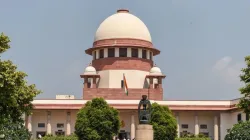State's power to make laws on industrial alcohol cannot be taken away: Supreme Court
The nine-judge Constitution bench of the Supreme Court was hearing a batch of petitions after a seven-judge Constitution bench ruled against the state governments.

The Supreme Court pronounced its verdict on the issue of overlapping powers of the Centre and states over the production, manufacture, supply and regulation of industrial alcohol on Wednesday. The apex court overturned a nine-judge bench verdict by 8:1 majority ruling, saying the Centre lacks regulatory power over production of industrial alcohol. The state's power to make laws on industrial alcohol cannot be taken away, it added.
A nine-judge Constitution bench headed by Chief Justice of India D Y Chandrachud pronounced the judgement.
On April 18, the bench had reserved its verdict after hearing arguments from Attorney General R Venkataramani, Solicitor General Tushar Mehta, senior advocates Dinesh Dwivedi and Arvind P Datar, who appeared in the court on behalf of the Uttar Pradesh government, apart from lawyers who represented the other states.
Industrial alcohol is not meant for human consumption. While Entry 8 in the State List under the 7th Schedule of the Constitution gives the states the power to legislate on the manufacture, possession, transport, purchase and sale of "intoxicating liquors", Entry 52 of the Union List and Entry 33 of the Concurrent List mention industries whose control was "declared by Parliament by law to be expedient in public interest".
While both Parliament and state legislatures can enact laws on the subjects mentioned in the Concurrent List, a central law will have primacy over the state law.
In 1997, the apex court ruled that the Centre has regulatory power over the production of industrial alcohol and the case came to be referred to the nine-judge bench in 2010. In 1990, the seven-judge bench observed through the Industries (Development and Regulation) Act, 1951, the Centre had "evinced a clear intention to occupy" the legislative competence on the subject and, therefore, Entry 33 could not empower a state government.
(With PTI inputs)
Also read: Bill Gates secretly donates USD 50 million to support Kamala Harris: Report
